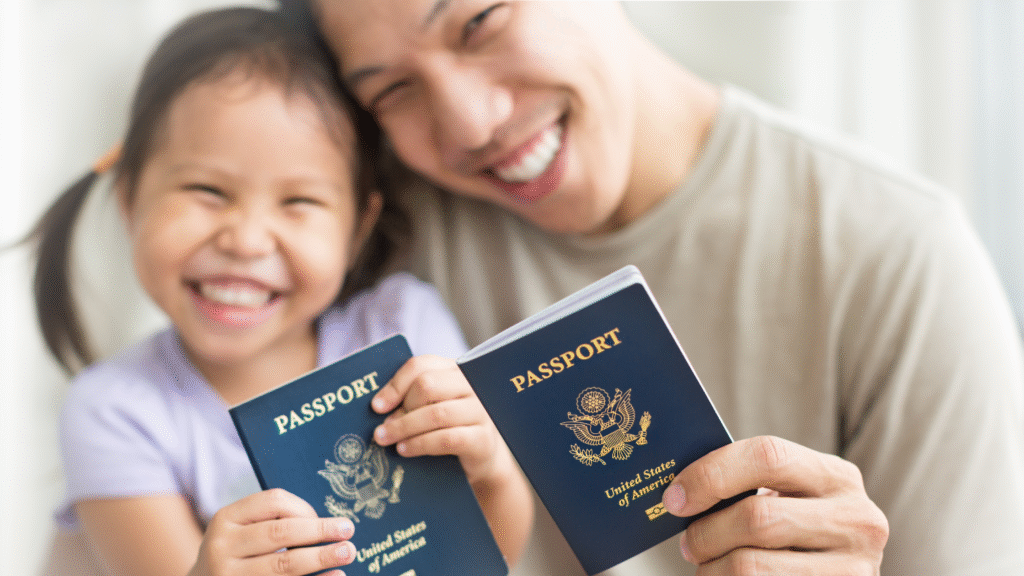Every parent’s first instinct is to protect their child. For many mixed-status families across the United States, that instinct comes with fear and uncertainty about the future. Learning the steps to protect kids in mixed-status families means navigating legal complexities, emotional stress, and practical preparations.
As of late 2025, immigration enforcement remains unpredictable, and mixed-status families continue to face serious risks. For undocumented parents of U.S.-born children, preparation is key. Your child’s citizenship does not automatically shield your family from separation. What can make the difference is being informed and ready.
Below are essential steps every family in this situation should take now.
Passports: Your Child’s Most Important Protection

If your child was born in the United States, they are a U.S. citizen with the right to a U.S. passport. That passport can be crucial if your family ever faces an emergency or sudden relocation.
Applying can feel intimidating when one parent is undocumented, but it’s both legal and safe when done correctly.
You will need your child’s birth certificate, both parents’ identification, and, in most cases, both parents’ consent. If one parent cannot appear in person, you must submit a notarized form (DS-3053).
Securing a passport now means your child will always have proof of citizenship and the freedom to travel if needed. It’s one of the most valuable forms of protection you can provide.
Emergency Plans: Acting Before a Crisis
No one wants to imagine being detained or separated, but an emergency plan ensures your child’s safety if something unexpected happens. Create a plan that includes:
- Naming a trusted guardian: Choose someone reliable who can care for your child temporarily or long term. Share all essential information such as school details, medical contacts, and routines.
- Preparing a power of attorney: This legal document gives your chosen guardian authority to make important decisions for your child if you are unavailable.
- Organizing documents: Keep copies of your child’s birth certificate, passport, and medical records in a safe but accessible place.
A clear plan brings peace of mind and ensures your child’s life continues with as little disruption as possible.
Cross-Border Custody Issues: Keeping Families Together

When deportations occur, U.S.-born children are sometimes left behind while parents return to their home countries. These cases can quickly turn complex, involving both American and foreign custody laws.
Without proper legal documentation, decisions about your child’s care may fall into the wrong hands.
The best approach is to consult both an immigration and a family-law attorney to set up guardianship and travel permissions in advance. This preparation helps you stay in control of your child’s future, even if circumstances change suddenly.
Legal Data You Should Understand
Mixed-status families are defined as households in which one or more members are undocumented while other members are U.S. citizens or lawful immigrants. Recent studies show that approximately 4.4 million U.S.-born children live with at least one undocumented parent, and an estimated 5.62 million citizen children live with an undocumented family member. Many of these children face heightened risks of separation, emotional trauma, and economic hardship if enforcement action is taken. Experts note that children in mixed-status families are more likely to lack health insurance, face barriers to care, and experience disrupted schooling. Understanding these realities is an important step in preparation and underscores the value of proactive legal planning for families navigating uncertainty.
Policy Updates in 2025: What You Should Know
Throughout 2025, some states have tightened data-sharing practices between local agencies and federal immigration authorities. As a result, certain schools and hospitals may now be required to disclose limited information in specific cases.
Knowing your rights is critical:
- You are not required to disclose your immigration status to schools or medical providers.
- Immigration officers cannot enter your home without a signed warrant from a judge.
- You have the right to remain silent and to contact an attorney before speaking to any officer.
Understanding these rights can prevent panic and help you make smart, safe decisions for your family.
We’re Here to Support You

At Qazi Law Offices, we’ve helped hundreds of families in similar situations secure passports, finalize custody plans, and prepare legal protections that safeguard their children.
If you want to create an emergency plan, verify your documents, or simply understand your options, we’re ready to help.
Call us today at 630-504-0648 or book a consultation with Attorney Farrah.
Sign up for our Newsletter for the latest immigration updates.
Follow us on social media for real-time guidance and support:
Facebook: Qazi Law Offices
Instagram: Abogada Farrah Qazi
LinkedIn: Qazi Law Offices
Your child’s future deserves careful protection, and it starts with the steps you take now.

